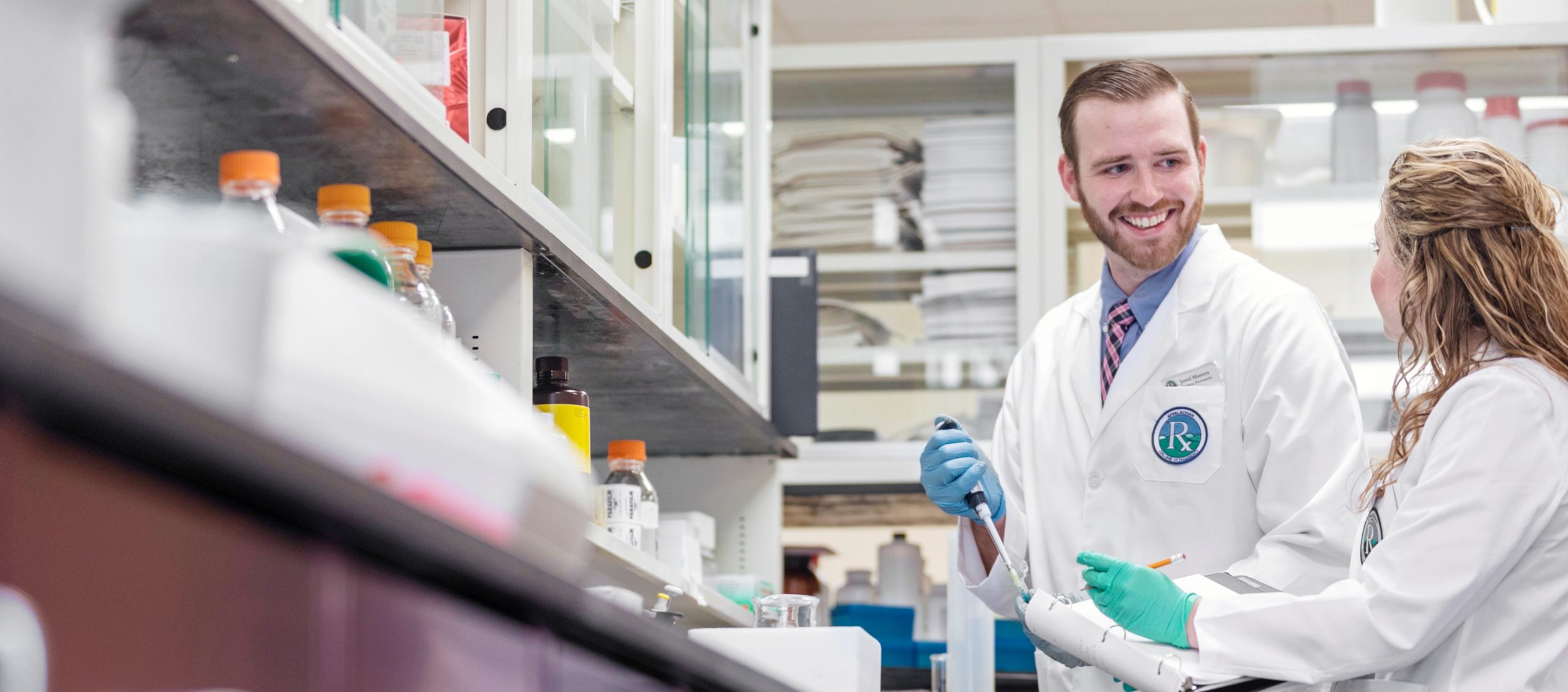Purpose – The purpose of this document is to identify and list a minimal assemblage of clear, concise, program-level, ability-based outcomes for the Doctor of Pharmacy Program at the American University of Health Sciences. The outcomes support the mission of the University and the missions of pharmacy practice and Doctor of Pharmacy education.
Goal – New graduates of the American University of Health Sciences Pharmacy Doctorate program are expected to be able to deliver high-quality, safe, and effective pharmaceutical care at a level of competence consistent with other entry-level generalist Pharmacy Doctorate practitioners. The outcomes for the program are based upon the current expectations described in accreditation standards published by the Accreditation Council for Pharmacy Education (ACPE), National Association of Boards of Pharmacy (NABP), and American Pharmacists Association (APhA), as well as other professional standards, guidelines, and codes. The outcomes specified in this document provide the basis for the evaluation of curriculum design and assessment of student competency.
PharmD Program Outcomes.
The Graduate Pharmacist:
1. Exhibits a comprehension of major scientific discoveries and methods as well as demonstrates conceptual competence in the delivery of pharmaceutical care. The graduate must demonstrate evidence-based knowledge of the theoretical foundations of the profession such as anatomy and physiology; pathophysiology; mathematics; diagnostic methods and decision making; pharmacological principles and pharmacotherapy; complementary therapies; drug interactions; treatment guidelines; patient education; and pharmacy law and apply these to individual practice settings. The graduate must also demonstrate comprehension of major scientific discoveries such as: basic principles of drug design and the chemical and biochemical mechanisms of drug action; basic principles affecting drug release from dosage forms, drug absorption, distribution, metabolism, excretion, and toxicology and the impact of those properties upon clinical pharmacokinetics and pharmacodynamics; fundamental principles involved in maintaining the microbiological purity of compounded dosage forms; basic principles of thermodynamics and kinetics and their role in defining chemical processes; basic principles of study design; application of the statistical methodology to study design and the scientific literature and the relevance of molecular biology, biochemistry, immunology, and pharmacogenomics and apply key principles to disease states and therapeutics as it applies to the practice of pharmacy.
2. Provides evidence-based, patient-specific, and culturally competent pharmaceutical care to individuals. As the health professional is primarily responsible for patient drug therapy outcomes, pharmacists must evaluate each patient’s drug treatment plan for appropriateness or inappropriateness and develop and implement population-specific, patient-centered pharmaceutical interventions utilizing a safe and accurate approach. To successfully accomplish this, the pharmacist must collect and evaluate patient data to determine and develop patient-specific drug therapy regimens and set appropriate pharmacotherapy goals in collaboration with the patient and other health care professionals based upon the best available scientific evidence.
3. Demonstrates the ability to solve problems and think critically. The graduate must examine issues rationally, logically, and coherently, acquire, evaluate, and synthesize information and knowledge relevant to an identified problem, and make sound decisions in both familiar and unfamiliar contexts. Specific skills include synthesizing information to draw logical conclusions, providing evidence-based support for recommendations and solutions, and making sound decisions when given complex scenarios in a time-constrained environment to the benefit of the patient, community, or group.
4. Demonstrates social responsibility, professional values, and ethical principles. As a trusted healthcare provider professional, the pharmacist applies knowledge and skills in the service of humanity and especially to underserved populations to reduce health disparities among people of different races, cultures, and socioeconomic statuses. The graduate pharmacist must demonstrate sensitivity to personal values and ethical principles in professional and social contexts. The pharmacist must exhibit professional behavior at all times in alignment with the pharmacists’ code of ethics; treat patients and co-workers with respect and dignity; respect the value and abilities of others; serve the individual, community, and societal needs; empower the patient and caregivers as active partners in the health care process; develop strategies to work through ethical dilemmas in the provision of pharmaceutical care; seek justice in the distribution of health resources; and provide pharmaceutical care in accordance with legal, ethical, social, economic, and professional guidelines.
5. Demonstrates personal responsibility, and promotes public health, health improvement, wellness, and disease prevention. The pharmacist must assure the patient of the availability of effective public health and disease-prevention strategies related to pharmacy care. Pharmacists can play a vital role in improving health promotion and disease prevention, responding to disasters, and contributing to public health initiatives and policy development. This is accomplished by: collaborating with the primary care provider in selecting the proper drug, and dosage for a specific patient; providing specific, sound, cost-effective, evidence-based drug and healthcare recommendations; critically evaluating patient data, research, literature and drug products; applying population-specific data, quality assurance strategies, educational strategies and research processes to identify and resolve pharmaceutical-care-related public health issues; devising risk reduction strategies to ensure patient safety; identifying best practices for implementing strategies to encourage patient adherence to therapeutic interventions; practicing safe techniques in order to maintain the microbiological purity of sterile products and employ associated quality assurance strategies; identifying barriers to health care and helping patients develop strategies for overcoming those barriers; and working in collaboration with other pharmacists and health-care providers to ensure best practices in the field of pharmacy. The pharmacist recognizes a personal responsibility for continuous professional development of oneself and demonstrates an ongoing commitment to lifelong learning. The maintenance of individual competence is a core responsibility of all health care professionals. This includes attendance at continuing education meetings as well as having the ability and motivation to continuously assess one’s own learning needs while engaging in self-directed learning to maintain one’s competence.
6. Applies successful management and leadership strategies for safe and effective pharmacy practice. Graduates must efficiently manage and use available resources in order to promote health and improve pharmaceutical care outcomes. Entry-level pharmacists must be able to perform basic management processes in their pharmacy practice settings and exhibit leadership qualities to develop and improve their practices and careers. This includes taking responsibility to ensure that adequate supervision of the drug distribution process guarantees that prescriptions are accurately interpreted, safely and accurately prepared and dispensed, and screened for drug-related problems. Key business principles must be applied to the management of pharmacy services, personnel, and revenue, including continuous quality improvement.
7. Advances the Profession. Pharmacists must actively work to advance their profession and the pharmaceutical care model of practice. The graduate must demonstrate an understanding of key issues which face the profession: cultural competence and the impact that cultural, social, and ethnic differences can play in the workplace and the provision of healthcare; health disparities and health literacy issues; and the strengths and challenges of cultural diversity and the historic responses of society in times of rapid change. Methods to achieve this end include participation in professional organizations; advocating for, establishing, and maintaining professional improvements; and ensuring that professional standards are achieved, maintained, and enforced.
8. Demonstrates competence in God-centered values, professionalism, and citizenship. The pharmacist recognizes the critical role that spirituality plays inpatient care as a social health service. Pharmacists actively and empathetically listen to patients, patients’ agents, and other health care providers. The pharmacist establishes a covenantal relationship with patients and promotes the good of every patient in a caring, compassionate, and confidential manner. AUHS graduates possess integrity and show respect for others’ healthcare beliefs, values, and practices. A critical role in community development and social–health service provision is based upon what the individual gives back to society and how graduates make a difference beyond the confines of the classroom. All graduates of the program are expected to discuss the importance that recognizing a higher mission and the noble privilege of community service has on the implementation of care and ultimately on improving the quality of health care for society.

